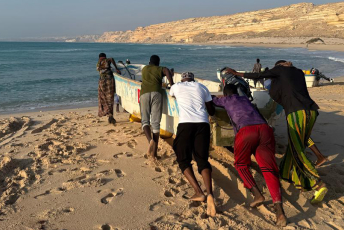In mid-November, Tunisian customs reported the seizure of contraband goods and six hunting falcons equipped with remote sensors – four of which died in transit – near the city of Remada in the Tunisian Sahara.
According to the president of BirdLife in Tunisia, Hichem Azafzaf, the trafficking of hunting falcons is a very lucrative illegal trade. The illicit trade in birds and other forms of wildlife is largely driven by demand from nationals in the Gulf countries, with endangered Houbara Bustards and Rhim gazelle being among the most threatened species.
In June last year, BirdLife issued a warning to the public and authorities following the illegal sale of greater flamingos, white storks and raptors in a market in downtown Tunis. Although the alert led to the arrest of the vendor, Azafzaf regrets that authorities ‘could not dismantle a bigger trafficking network.’ More than 10 000 birds are captured illegally each year, according to him.
Incidents like these are not specific to Tunisia, but occur across the Maghreb. In the Morocco-Algeria border region, similarly worrying cases have been observed.
In September last year, Algerian authorities revealed that some 5 304 goldfinches – a songbird prized for its distinctive plumage – were seized between 2017 and 2018 in Tlemcen, close to the Moroccan border.
A 2017 study published in the journal Nature found that poaching of this protected species had led to a reduction of almost 60% in the number of goldfinches in their native western Maghreb. Prices in Europe range from €10 per gram to €10 000 a piece for rare specimens, and the trafficking is flourishing thanks to a highly organised structure for the capture, dispatch and smuggling of the birds.
Other species are also being poached and trafficked. Protected tortoises are captured by individuals in Tunisia to be sold to European tourists or smuggled across the Mediterranean, while in Algeria, larger groups illegally hunt hyenas and jackals to sell body parts in neighbouring countries for use in ritual magic. Similarly, glass eels are illegally fished Morocco and smuggled to Asia through Spain and Portugal; and the Barbary macaque – the only primate native to North Africa and currently found only in Morocco – is heavily trafficked, despite being red-flagged by the International Union for the Conservation of Nature’s Red List of Threatened Species since 2008.
Algeria recently announced that between 2011 and 2016, the National Gendarmerie seized 15 774 animals, comprising 15 species, but there is a shortage of data regarding the extent of wildlife crime and criminal networks across the region.
Despite efforts to raise public awareness and to establish partnerships, adequate responses – such as adapted legislation, or focusing on local flea markets – are still lacking, and traffickers act with impunity. Worldwide, wildlife crime is believed to be the fourth-most lucrative crime; and North Africa is clearly not immune. Environmental, justice and law enforcement authorities at the national level, as well as the international community, should step up concrete actions to tackle this problem.
Jihane Ben Yahia, ENACT Regional organised crime observatory coordinator – North Africa, ISS







